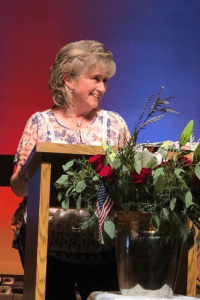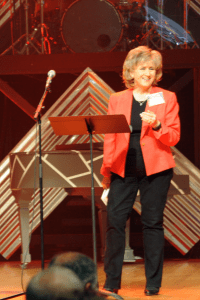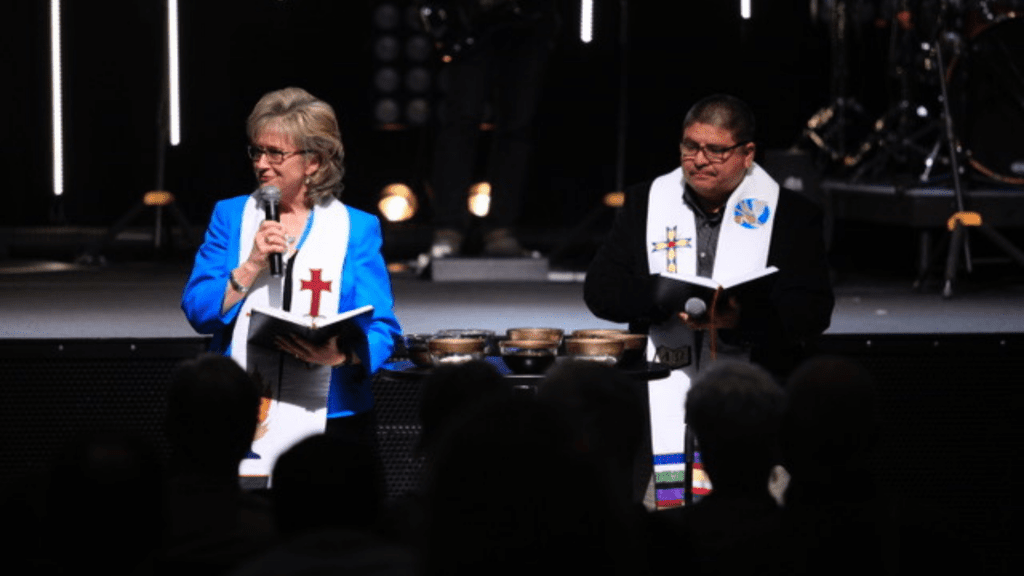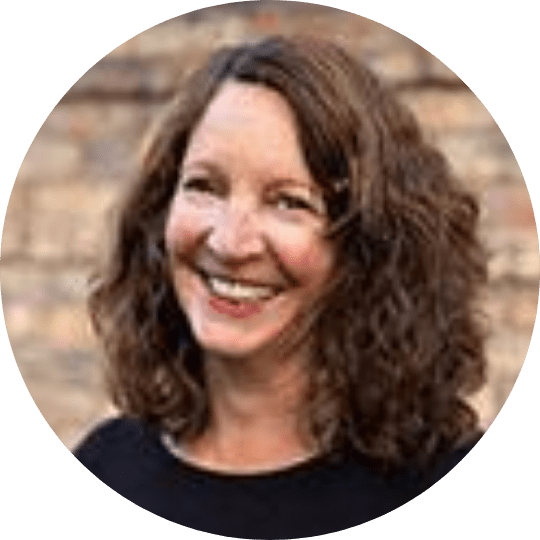Recently the Companion sat down with Tammy Swanson-Draheim over Zoom to ask her about how she became Covenant, her call to ministry, and what she has learned about the church. Swanson-Draheim is the superintendent of the Midwest Conference and the nominee to become the next president of the Covenant. She will stand for election at Gather in June.
Cathy: On the Love the Cov podcast we have been asking guests when they first felt like they were Covenant? How would you answer that question?
Tammy: I was born into the Covenant. I was adopted, and when I was brought home, I attended Peninsula Covenant Church in Redwood City, California, with my parents from day one. The Covenant is really the only church I’ve ever attended. I was confirmed and baptized here. I experienced a renewal of faith at a Covenant camp. I was educated at North Park Theological Seminary and University. I have lived out my vocational call in the institutions and churches of the Covenant, and I feel spiritually formed here.
I appreciate so much about us—our heritage, our values, our commitment to mission. I have great love for the people of the Covenant. I’m not suggesting that I think our Covenant Church is perfect by any means! I think it was Dave Olson who said in church planter training that the Covenant is the dog with the least amount of fleas.
Oh wow, I haven’t heard that before.
I love that description because it says something about our humble nature, our love for each other and this great denomination, but we’re not trying to say we’re perfect. I think that’s important.
Can you tell us how you experienced your call to ministry?
Partly my answer reflects my understanding of ministry, which is to say that when you are a disciple of Jesus Christ, you are called into ministry, period, whether it’s vocational or lay ministry. So like everyone else, I started out in lay ministry. I’d had a very profound encounter with God in which my life took a 180-degree turn at Mission Springs Camp in 1992. After that, I attended the church I had visited a few times, and I was so excited about fellowship with other Christians—I was just on fire.
 One day I invited someone over to my house, and that invitation was met with a less-than-great response. When I left church that day, I was so disappointed. My boys were in the backseat, and I think I was probably crying a little bit.
One day I invited someone over to my house, and that invitation was met with a less-than-great response. When I left church that day, I was so disappointed. My boys were in the backseat, and I think I was probably crying a little bit.
At that moment, I didn’t exactly hear the voice of God, but I clearly had an impression from God that was like this: “Tammy, you can either feel sorry for yourself, or you can make sure no one who comes through the door of my church will ever have that experience again.”
I had no official ministry position, but I heard that as a mandate from God. I went back and did everything I could to meet people, to recognize every new person who came through the door, to be sure to greet people, and to invite people over and love on people.
The funny thing is that when you do that, suddenly you find yourself in the center of the church, because when new people come, they all get to know you. When I was asked to lead the women’s Bible study, which was a big group, I thought, “Are you kidding me?” But I was excited about Scripture, so I’d study for hours and then go and lead those women. I received more invitations like that.
When I was asked to take responsibility for a particular area called the Care Ministry, the first thing I did was to invite about a dozen people who I thought had those gifts to gather to pray about this ministry. We put a few thoughts on a whiteboard, and we talked and prayed together. Then I said, “I’m going to pass around a sheet, and if you’d like to be a part of this team, put your contact information on it.” I think 11 of the 12 people responded.
When I reflect on that, I think that’s being inclusive of the body of Christ. It is praying together about something and forming a plan. I would not have given words to it at the time, but that was probably my first vision talk.
When I began to passionately follow Jesus, I just said yes to whatever he invited me into. I never spoke in public, but the first time I was invited to speak in church about my testimony, I decided to say yes. I thought, “Okay, Lord, it’s an invitation from you. I get to brag on you.” But I remember sitting in the front row and just praying and saying, “Lord, I don’t know what’s going to come of this. You know I don’t speak in public, but this I offer to you as my act of worship.” I got up, and my knees were knocking, and I’m sure my lips were sticking to my teeth. That determination to say yes to God’s invitation meant I said yes to many things that felt risky.
That’s a story to say it doesn’t matter whether you think you have the gifts—just say yes to God’s invitation. Often women in ministry feel they have to have every “i” dotted and “t” crossed—and even then, they’re still unsure. So I try to support women by telling them, “Just say yes. If your pastor asks you to preach, don’t say, ‘That’s not my gift.’ How do you know if you’ve never done it? Say yes to what God’s inviting you into and allow him to lead and direct through that.”
When I got to Chicago to go to North Park Seminary, we decided to go to Grace Covenant Church, where Deb Gustafson was the lead pastor. I really hadn’t had examples of female lead pastors before that. So Deb’s presence was really important to me.
I have lived out my vocational call in the institutions and churches of the Covenant, and I feel spiritually formed here.
After seminary, it was clear to me that God was calling me to a lead role. He literally gave me a vision and a confirmation of my gifts. I knew that I was called to lead a local church and that God gifted me to be a primary leader. I think it’s okay to say that out loud.
But I had to wait. All my seminary colleagues were getting calls, but it was radio silence for me. One leader said to me, “If you just would take an associate role, we could put you in a really large church. It would be like having your own congregation.”
I had to say, “No, I am very clear on what God’s calling me to.” We graduated in May and many people had their calls and were getting phone calls starting the preceding January. As I waited, God gave me these confirmations that I could be patient because he was superintending over this.
When I did finally get the call, it was to a lead pastor role, not even a solo pastor. So God knew what he was doing.
In the end actually, I was invited to candidate at three places in one week. I was attracted to the church I went to, not because of geography or anything like that, but because the church had had a really rough go. I felt like God was giving me a vision for how I could be helpful to this church.
That’s probably another stream in my call story—going into difficult places, because I love being used of God, to be a part of what he’s doing to redeem difficult situations. And as you know, this is a difficult time for our denomination.
I’m intrigued by that framing. Often we hear that women do get called into difficult churches because those are the only churches that will take women. I hear you saying it’s not a second-best kind of calling, it’s God’s calling.
I think that I would have not said it that way in the beginning when I first got the call. I would’ve said, “Oh, I see some problems. And I think I have some thoughts about where to go.” But over time I’ve come to recognize that God often does call me into places where change is needed and things might be difficult. I’m not really afraid of conflict—no one likes conflict, but I can see the redeeming value in it. And I’m willing to do what it takes to see us through the other side.
You’ve served as the superintendent of the Midwest Conference since 2011. What have you learned in that role?
I realized early on when I was a local church pastor that I had a deep love for the broader community, for my colleagues across the Covenant. As I served on the Board of the Ordered Ministry and worked with congregational vitality, I realized that I really love Christ’s church and the Covenant Church in particular. It was a joy to serve in these places.
If I could rename the superintendency, I would rename it as “mission leader.” I enjoy leading in mission, and I get to lead a team of fantastic people in a context where we have huge diversity, along many lines.
So boy, have I learned a lot about the church. The diversity, oh my goodness! I can worship in a church that is a lot of older Swedish people, where we sing out of a hymnbook. I love those people and enjoy their heart language. Then I can go into one of our newer churches, a Kenyan church full of Kenyan immigrants. And the visiting evangelist who’s singing and dancing pulls me out of my chair. I have no rhythm, but when you’re in that environment and you’re worshiping in that way, and you’re called out of your seat to dance—you dance!
What challenges have you experienced in this role?
Obviously, there are hard things. Working with conflict is one of my primary roles. If we really believe that God can redeem things and use things for his glory, then we can envision conflict a little differently, like something we do need to get through. It will probably require a lot of healing, but God can use it and he can help us to grow through it.
When men and women work together in harmony, we’re actually demonstrating something to the rest of the world that they desperately need to see and know.
One of the things that I have learned is the importance of meeting people where they are. It’s so beautiful to see how God works outside of our clever strategies. Urban Heights Covenant Church outside of Des Moines, Iowa, is a very small church. A person from eastern Congo walked through their doors years ago, and they loved on this person and eventually they became family. Pretty soon, other eastern Congolese were starting to gather, and local pastors started investing in this young man. He had pastoral gifts, a church was formed, and he’s the leader. That church has far outgrown the little church that planted it. It’s full of families and young people, and they’re doing ministry in the community. This is the Spirit of God at work, and we’re just fanning the flame!
I think, as we probably are all aware, there’s a lot that we need to learn right now about how we’re going to do church going forward in this landscape. And here’s God with this shining example of what he can do.
In my work, we’re focused on strategy all the time. I love the concept that God works outside our clever strategies.
The church is the only institution I know of that is specifically designed for those who are not within it. We exist for others. A lot of healing happens when we’re able to focus on other people’s needs. We exist for those who don’t yet know the love of Christ, and I believe Jesus is so deeply invested in the health and vitality of his church. I believe he’ll do anything to help us if we ask him and cooperate with what he’s doing to help us get there.
You’re the first woman to be nominated to serve as president of the Covenant. Can you tell us about your experience as a woman in ministry serving the church?
It’s important for me to say first and foremost that when I’ve been called into a role, I haven’t really spent time contemplating the fact that I’m a woman. So, for example, if I become the president-elect, I will first and foremost serve as president, and I will serve as president for all the people. Second, I will be a president who happens to be a woman. I do feel confident that the Presidential Nominating Committee chose me not because of my gender, but because of what I could bring to the role.
 When men and women work together in harmony, we’re actually demonstrating something to the rest of the world that they desperately need to see and know. This is all about the kingdom, it is deeply grounded in Scripture and our understanding of the trajectory of where God is leading us, becoming who we were created to be. The church of all places should be leading in this, honoring women, serving together, demonstrating that beautiful harmony—not women above men, not men above women, but working together.
When men and women work together in harmony, we’re actually demonstrating something to the rest of the world that they desperately need to see and know. This is all about the kingdom, it is deeply grounded in Scripture and our understanding of the trajectory of where God is leading us, becoming who we were created to be. The church of all places should be leading in this, honoring women, serving together, demonstrating that beautiful harmony—not women above men, not men above women, but working together.
When I started in this role, I was one woman on the Council of Superintendents of 15 for seven of my 11 years.
That’s a long time to be the only one.
That’s a long time to be the only woman. Thank goodness, it’s different now.
When I started ministry in the local church, there was a man who was opposed to women in ministry. In my naivete, I thought I could just love on him and kill him with kindness. Most people are swayed once they experience a woman’s leadership, and they say, “Oh, this is okay.” But this particular gentleman really struggled, and it came to a head when he started exhibiting some behaviors that weren’t healthy for the whole body. A young couple came to me one morning, upset because they had overheard him in the lobby saying negative things about my husband and me. We had a lot of visitors coming and the church was growing. It was as if the more the church got healthy, the angrier he got.
Eventually, his own friends went to him to say, “You need to find another place to worship where you can be healthy and thrive and you can align with what’s happening there.” And so he and his wife left the church. It was heartbreaking for them, and I felt bad for them.
Fast-forward a few years, I’m in a coffee shop and I run into this couple. They asked if they could have some time with me. I said, “Sure. I just need to use the facility first.”
I went into the bathroom and just prayed. “Lord, what is happening? Give me your grace, give me the right words, help me, Lord.”
So I sat down with this couple. They had asked to speak with me because he wanted to apologize for the way he had treated my husband and me. I said, “Of course I forgive you.” I don’t know that he changed his mind, but we prayed together and it was a beautiful conclusion to such a mess.

What word do you sense God speaking to the Covenant right now?
First of all, let’s stay focused on mission. I think we all know there’s been a lot of fracturing happening in our denomination. One of my key verses for ministry comes out of 2 Corinthians 5, where it talks about the ministry of reconciliation, and how we’re invited by God into this ministry. In fact, God has entrusted it to us, and we’re his ambassadors. We are God’s plan for his ministry of reconciliation, which is multifaceted—it’s reconciliation to God, to each other, to God’s creation.
I don’t have the solutions. And I don’t think God called me to come into a potentially new role with a game plan. I think he calls me to come and listen to his people, and to work together under his leadership and the guidance of the Holy Spirit toward solutions together.
When I think about the word for today, I want to offer this up carefully—I think of John 17 where Jesus is heading to the cross. He is on his knees, praying fervently in the Garden of Gethsemane. We may wonder, “What could possibly be on the mind of our Savior in that moment?” He’s praying for the unity of the church, a unity that he describes as being like the unity the Father has with the Son. Then he goes on to say that when we’re brought to complete unity, the church will know that Jesus comes from God and that God loves the world. So it’s not just about us—it has everything to do with our mission. When people look at the church and see us being united, they will believe in our message. And then they will believe that God actually loves them.
I don’t have the solutions. And I don’t think God called me to come into a potentially new role with a game plan. I think he calls me to come and listen to his people, and to work together under his leadership and the guidance of the Holy Spirit toward solutions together. There’s fracturing in so many areas that are not becoming of Christ’s church. I hope we can find a way forward.
That’s a beautiful picture. Is there anything else delegates should know that I didn’t ask you yet?
On a personal level, I take my grandma role very seriously! I have four grandkids: a six-year-old girl named Garnett in Phoenix; and three here in Omaha, a four-year-old named Bryleigh, a two-year-old named Huxly, and a four-month-old named Quinton Kelly Draheim. That name means a lot to me. I think the greater church might know that I was recently widowed in December of 2020 and the journey I have been on after losing my husband, Kelly. God has been so good to me on that journey. And when we’re in the midst of those journeys—in the crucible of suffering—that’s when God does some of his best work, right?
Shifting gears, can you tell us about the books currently on your nightstand?
I grabbed my book pile and brought it down here so I can tell you.
First and foremost are the devotionals. The one I’m most committed to is Gift and Task, by Walter Brueggemann, which takes you through the lectionary readings each day. That’s the most important one for me, because I read four Scriptures each day. My current spiritual practice is around journaling. I think the practices that fill your spiritual tank and connect you to God change with the seasons, but that’s a current one for me.
The other devotional is called Bible Sisters, written by Gennifer Benjamin Brooks, who is a Black theologian. This book highlights one female in Scripture each day. I’m committed to reading diversely. I want to read men and women, people of color, white men—it’s all part of formation.
I start a lot of books and don’t always finish them all. I’m partway into The Deeply Formed Life, by Rich Villodas and Pete Scazzero. I’ve been reading a book called Shift, by Dietrich Schindler because we’ve had a cohort around that. I’m reading The Making of Biblical Womanhood, at the request of the senior pastor cohort I’m leading. And I just finished reading The Vanishing Half, which is a novel by Brit Bennett. I was on vacation for a week and gobbled it up. That’s just a taste—I have way too many books and way too little time!
Stay tuned for more Q&A with other nominees who will stand for election at Gather 2022.














